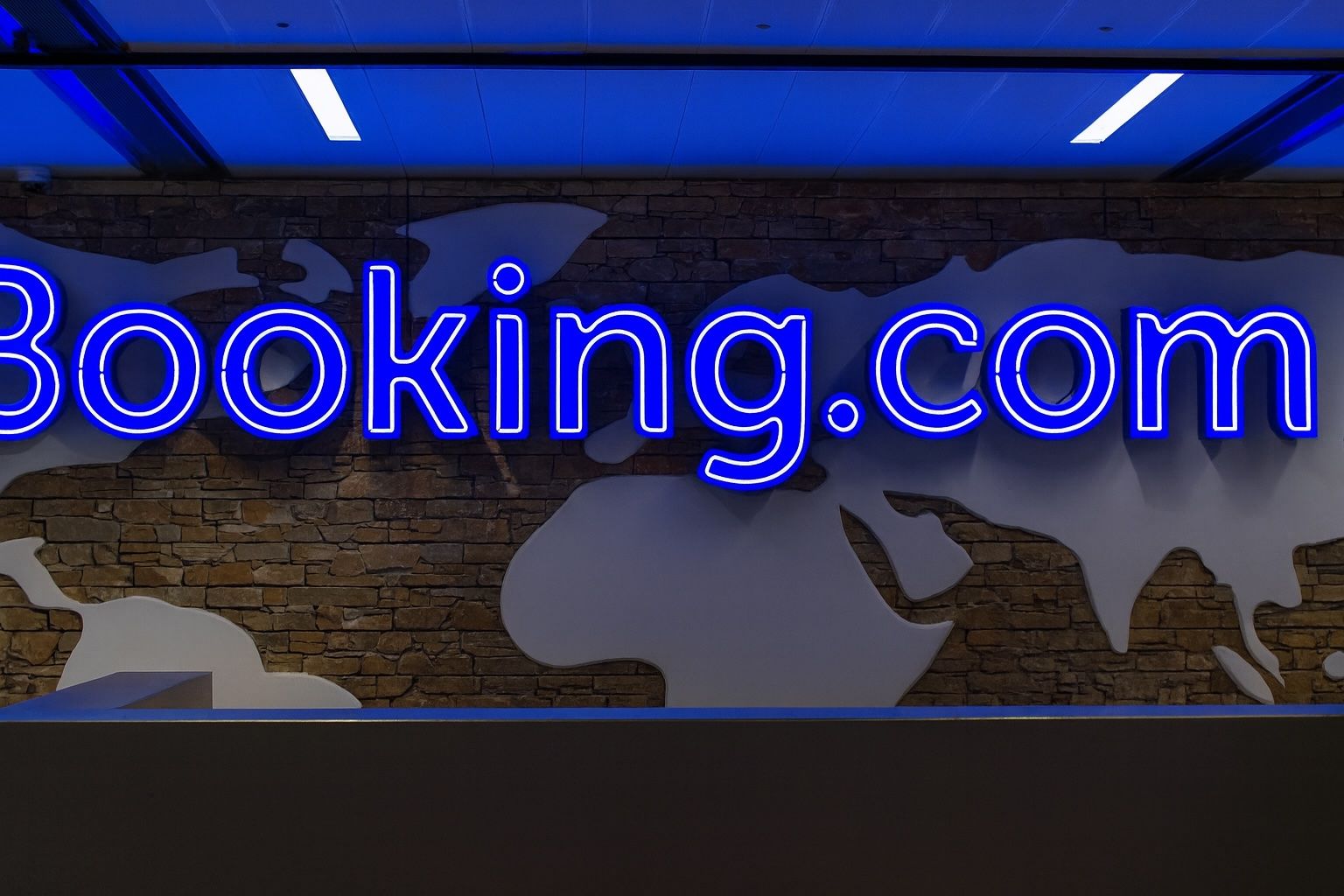- Blowout Q3 Results: Booking Holdings (NASDAQ: BKNG) reported third-quarter adjusted earnings of $99.50 per share on revenue of $9.01 billion – comfortably topping Wall Street estimates (~$96 EPS on $8.7 billion revenue)reuters.comreuters.com. Net profit rose to $2.75 billion (GAAP), and gross travel bookings jumped 14% year-over-year to $49.7 billion amid steady travel demandreuters.com.
- Shares Jump on Strong Demand: BKNG stock surged nearly 5% in after-hours trading on Oct. 28 following the earnings beatreuters.com. The company cited “continued momentum with steady travel demand” entering Q4 despite macroeconomic and geopolitical uncertaintiesreuters.com. More travelers are bundling full trip packages on Booking’s platforms, boosting resultsreuters.com.
- Holiday Travel Outlook Upbeat: Booking projected robust growth for the holiday quarter, guiding for 11–13% gross bookings growth and 4–6% higher room nights in Q4247wallst.com. CEO Glenn Fogel noted “double-digit gains in gross bookings and revenue” in Q3 and expressed confidence in the “momentum we’re building for the future”247wallst.com. Industry data similarly suggests 2025’s holiday travel season could shatter records as consumers continue to prioritize travelcbsnews.com.
- Stock Near Highs After Rally: As of Tuesday’s close, BKNG shares were around $5,130 – up ~18% over the past 12 monthsnhregister.com – before jumping toward $5,300 after hours on the earnings news247wallst.com. The stock trades near the top of its 52-week range (~$4,100–$5,839)ts2.tech and has gained a modest ~3% year-to-datenhregister.com. Analysts note the valuation (~24× forward earnings) remains reasonable given Booking’s growthts2.tech.
- Analysts Bullish on Booking: Wall Street sentiment is broadly positive. KeyBanc Capital Markets just initiated coverage of BKNG with an Overweight rating and a Street-high $6,450 price targetts2.tech, citing Booking’s global scale, high margins and aggressive push into AI-driven services. Consensus forecasts already anticipated solid growth (Q3 revenue +9%, EPS +14% YoY)ts2.tech, which Booking exceeded. Experts say the company’s platform strength and tech investments position it to “outpace the broader industry” as travel continues to reboundts2.tech.
Q3 Earnings Beat Lifts Booking Holdings Shares
Online travel giant Booking Holdings delivered a strong third quarter, comfortably beating analyst expectations on both revenue and profit. Revenue for Q3 2025 came in at $9.01 billion (up ~13% year-on-year), topping the ~$8.7 billion consensus estimatereuters.comreuters.com. Adjusted earnings were $99.50 per share, likewise exceeding forecasts (analysts had expected around $95–96)reuters.com. This marks Booking’s fourth straight quarter of outperformance on both metrics247wallst.com247wallst.com. The better-than-expected results were fueled by steady travel demand and an uptick in customers booking bundled trips (flights, hotels, rental cars) on Booking’s platformreuters.com.
In a statement, the Norwalk, CT-based company said that while “uncertainty” persists in the macroeconomic and geopolitical backdrop, travel trends remain strong heading into year-endreuters.com. “We are pleased to see continued momentum with steady travel demand trends in our business so far in the fourth quarter,” the company notedreuters.com. This optimism was reinforced on the earnings call, where management highlighted resilient consumer appetite for travel and successful execution of its strategy. Notably, total gross bookings jumped 14% year-over-year to $49.7 billion in Q3reuters.com, and room nights booked were up about 8% to 323 million, underscoring robust usage across Booking’s platforms247wallst.com.
Investors reacted enthusiastically to the Q3 beat. BKNG shares rose nearly +5% in after-hours trading on October 28 following the resultsreuters.com. The stock had closed the regular session around $5,130, then spiked toward ~$5,300 in late trading as the strong earnings and bullish outlook came in247wallst.com. This puts the stock within reach of its record high ($5,839) set earlier in the yearts2.tech. By beating expectations and affirming healthy travel demand, Booking allayed recent market concerns and set a positive tone going into the holiday season.
Steady Travel Demand and Holiday Outlook
The third quarter performance reflects a sustained travel boom that shows little sign of cooling. Booking Holdings’ core metrics all improved: the company facilitated 323 million room nights in Q3, up ~8% from a year ago247wallst.com, and saw double-digit growth in gross bookings (+14%) and revenue (+13%) despite what has been a murky economic environmentreuters.com247wallst.com. CEO Glenn Fogel lauded the results, stating Booking is “pleased to report a strong third quarter, with 8% room night growth and double-digit gains in gross bookings and revenue, highlighting the strength of our platform”247wallst.com. He credited disciplined execution and the company’s global reach for driving the robust growth, while also noting momentum in newer areas like the “Connected Trip” initiative (which encourages customers to book multiple trip components through the Booking ecosystem).
Looking ahead, Booking’s management struck an upbeat tone for the holiday travel season and beyond. The company issued guidance calling for 11%–13% growth in gross bookings and 4%–6% growth in room nights in the fourth quarter of 2025247wallst.com. If achieved, that would extend the travel recovery into the important winter holiday period. For full-year 2025, Booking now anticipates roughly 12% revenue growth247wallst.com, indicating that travel demand remains robust across regions. This bullish outlook aligns with signals from the broader industry – new data suggests the 2025 holiday season could set fresh records for travel spending and air bookings in the U.S.cbsnews.com. Indeed, travel analytics firm Cirium recently found flight bookings for Thanksgiving and Christmas are tracking ahead of last year’s pace, pointing to record-breaking holiday travel interest.
Booking’s ability to capture this demand is evident in its latest results. The company pointed to particular strength in alternative accommodations (vacation rentals) and continued growth in direct bookings via its websites and apps, aided by its Genius loyalty program and digital marketing efforts. While inflation and higher airfares have been a concern for consumers, so far travelers seem willing to spend on trips – perhaps prioritizing experiences after years of pandemic disruptions. Even geopolitical events (such as conflicts and an uncertain economy) have not significantly dampened overall travel volumes, according to Booking. The company acknowledged some macro pressures but emphasized that travel has remained a priority for consumers, a trend it expects to continue into 2026 barring any major shocks.
BKNG Stock Performance and Recent Moves
Booking Holdings’ stock has been a strong performer over the past year, reflecting the company’s earnings momentum. Prior to the latest report, BKNG had climbed about +18% in the last 12 monthsnhregister.com, handily outperforming the broader market. Year-to-date gains have been more modest – roughly +3% in 2025nhregister.com – as the stock took a breather following a big run-up in 2023. In early October, BKNG shares were trading near all-time highs around $5,300–$5,400, but pulled back 6–8% amid broader market volatility and some profit-taking ahead of earningsts2.tech. In fact, over the month leading into the report, BKNG had drifted slightly lower even as some travel sector peers’ stocks rosets2.tech.
That backdrop set the stage for this week’s rebound. With Q3 earnings coming in above expectations and reassuring investors, BKNG is now regaining lost ground. After-hours on Tuesday, the stock approached ~$5,300247wallst.com, not far from its 52-week high of $5,839ts2.tech. The latest pop puts Booking near the top of its trading range and gives it a roughly $200 billion market capitalization. Some analysts note that even at these levels, Booking’s valuation is not stretched relative to its growth outlook – the stock trades around 23–24 times forward earningsts2.tech, in line with the broader tech-enabled travel sector. By comparison, many high-growth tech stocks command far higher multiples. Booking’s moderate P/E, combined with its ongoing $1+ billion share buyback program and quarterly cash dividend ($9.60 per share), signals management’s confidence in the company’s cash generation and fundamentals247wallst.com.
It’s also worth noting that Booking’s stock volatility this year has been relatively low given the market’s ups and downs. The company’s steady execution and consistent earnings beats have provided a degree of support. Still, BKNG isn’t immune to external swings – macroeconomic news and geopolitical events (like oil prices, war impacts on travel routes, or currency fluctuations) can influence travel stocks broadly. For now, though, sentiment has swung back positive. “The stock may test its 52-week high again” if Booking continues delivering and travel demand holds up, analysts at TechStock² observed ahead of the earningsts2.techts2.tech. The post-earnings rally suggests investors are once again “buying the dip” on BKNG, betting that the company’s leadership in online travel will drive further gains.
Analysts See More Upside for “Travel Titan”
Wall Street analysts are largely bullish on Booking Holdings following its latest results, citing the company’s dominant position in a rebounding travel market. In fact, just days before the earnings, TechStock² (ts2.tech) reported that KeyBanc Capital Markets initiated coverage of BKNG with an Overweight rating and a $6,450 price target – one of the highest on the Streetts2.tech. That target implies roughly 25% upside from current prices. KeyBanc’s note praised Booking’s global scale (with brands like Booking.com, Priceline, Agoda, Kayak, and OpenTable), its strong profit margins, and growth opportunities from new technology. The firm highlighted Booking’s heavy investments in artificial intelligence and its “Connected Trip” strategy as key factors that could drive future market share gainsts2.techts2.tech. KeyBanc analysts even suggested that “online travel platforms will continue to outpace the broader industry” as travel normalizes post-pandemicts2.tech – a promising sign for market leaders like Booking.
Other analysts echo this optimism. Consensus forecasts for 2025 have been ticking upward in recent months, and after Q3’s beat, many analysts are revising their models higher. Prior to earnings, the Zacks consensus expected Booking’s full-year 2025 revenue to reach about $26.3 billion (+11% YoY) with EPS around $221ts2.tech. Those figures may rise given the company’s new guidance and continued momentum. “Booking’s 2025 estimates have been creeping upward,” noted a Zacks report, which currently has the stock at a Hold due to near-term uncertaintyts2.tech. However, the overall sentiment skew is positive: according to Refinitiv, the vast majority of covering analysts maintain “Buy” or “Overweight” ratings on BKNG. Many have price targets well above $5,500 a share, reflecting expectations that Booking’s earnings growth (and aggressive share buybacks) will drive the stock higher over the next 12-18 months.
Several firms have pointed to Booking’s resilience and execution in a challenging environment. UBS analysts recently called Booking their top pick in online travel, arguing that the company’s focus on direct bookings and loyalty (versus reliance on Google search traffic) gives it an edge. Morgan Stanley, in an early October note, highlighted Booking’s strong free cash flow and optionality to invest in new growth areas or return more cash to shareholders. And after this earnings release, Jefferies analysts remarked that Booking is “firing on all cylinders”, with even formerly lagging segments like meta-search (Kayak) stabilizing. One area to monitor is the impairment charge Booking took this quarter on its KAYAK unit – a $457 million write-down reflecting softer outlook for that flight search business247wallst.com. Excluding that one-time accounting charge, Booking’s core results were even stronger, and it didn’t faze analysts who view it as a prudent acknowledgment of challenges in that niche. “The underlying earnings power remains robust,” noted 24/7 Wall St., emphasizing that Booking’s adjusted EBITDA margin hit 47% – up 1.2 percentage points – despite higher operating costs247wallst.com247wallst.com.
All told, Wall Street seems convinced that Booking’s long-term trajectory is intact. The combination of sustained travel demand, market-leading scale, and tech-driven efficiency has analysts “betting BKNG could significantly outpace its peers” going forwardts2.tech. As long as people keep traveling and Booking keeps executing, many see further upside for this online travel titan.
Broader Travel Trends and Economic Context
Booking’s strong performance is unfolding against a backdrop of both industry tailwinds and economic cross-currents. On one hand, consumers worldwide have eagerly returned to traveling, bolstered by pent-up demand from the pandemic years. This has created a rising tide lifting travel companies. Expedia Group’s CEO, Ariane Gorin, recently affirmed this trend, saying “since July, we’ve seen an uptick in overall travel demand, particularly in the U.S.”ts2.tech. Expedia in fact raised its outlook for 2025 bookings growth to +3–5%, after seeing a resurgence in summer travelts2.tech. Similarly, Airbnb reported record summer volumes (Q2 nights booked up 7%, gross bookings +11%), and noted “travel demand picked up” each month in Q2 as U.S. leisure travel reboundedts2.techts2.tech. (Airbnb’s CEO Brian Chesky did caution that growth could slow in late 2025 due to tough year-over-year comparisonsts2.tech, but the overall trajectory remains positive.)
At the same time, macroeconomic worries linger in the background. High inflation, rising airfare costs, and international conflicts (which can disrupt certain travel corridors) pose potential headwinds. Global tourism spending is still recovering; Reuters reports that U.S. international visitor spending may fall about $12.5 billion in 2025 versus pre-pandemic trendsts2.tech. However, industry experts remain optimistic that these challenges are manageable and temporary. Travel demand has proven resilient through inflation spikes and geopolitical tensions so far. Many travelers appear to be prioritizing vacations and experiences, even if they have to budget around higher prices. “Experts remain optimistic [for the] long-term” outlook, according to Reuters, even acknowledging the near-term economic pressurests2.tech.
For Booking Holdings, the competitive landscape in online travel also provides context. The company’s closest rivals, such as Expedia (which owns brands like Expedia.com, Vrbo, and Hotels.com) and Airbnb, are all investing heavily to capture the travel rebound. A key theme is technology and AI innovation: for instance, Expedia has been rolling out generative AI features (like a travel planning chatbot built on ChatGPT) to streamline bookingsts2.tech, and Airbnb is enhancing its platform with more personalized search and AI-driven host tools. Booking has not stood still – in fact, analysts say it may be ahead of the curve. CEO Glenn Fogel has described Booking as going “full bore” into AI, deploying generative AI assistants across its brands and customizing recommendations for usersts2.techts2.tech. The goal is to improve conversion rates and encourage travelers to use Booking’s services for every aspect of their trip. An industry-wide trend is toward more personalized, one-stop travel planning, and Booking’s initiatives (such as an AI trip planner in Kayak, automated customer service bots, and deeper loyalty perks) aim to keep it at the forefront of this shiftts2.tech.
Moreover, Booking’s sheer scale and diversification give it a strong competitive moat. The company operates a portfolio of well-known travel sites (Booking.com for accommodations, Priceline for deals, Agoda in Asia, Rentalcars.com, OpenTable for dining, etc.), which collectively cover hotels, vacation rentals, flights, car rentals, and restaurant reservations. This breadth provides cross-selling opportunities and a data advantage. It also affords pricing power with suppliers (hotels and airlines) that smaller competitors can’t easily matchts2.tech. As a result, Booking can maintain high profit margins – as seen in its 47% adjusted EBITDA margin this quarter247wallst.com – while still investing aggressively in growth.
Looking at the economic context, the travel sector is benefiting from a broader services spending boom. Consumers, especially in the U.S. and Europe, have been shifting spending from goods to services, and travel is a prime beneficiary. This has helped offset headwinds like higher interest rates or a cooling job market. There are still risks on the horizon – for example, if central banks’ rate hikes tip major economies into recession, leisure travel could eventually slow. But so far, 2025 is on track to be a banner year for travel. Industry groups project record numbers of holiday travelers, and airlines and hotels have reported strong bookings deep into the fourth quartercbsnews.com. Business travel and cross-border tourism are also gradually improving.
In summary, Booking Holdings finds itself in an enviable position: it is riding a global travel recovery while leveraging its scale and technology to stay ahead. The company’s Q3 results and upbeat outlook reflect not only its own execution, but also the broader resilience of the travel sector in the face of economic challenges. As one analysis put it, Booking is “well-positioned” to capitalize on secular tailwinds like the shift to online booking and the return of international travelts2.techts2.tech. If current trends hold, Booking and its shareholders could continue to see sunny skies ahead, even as the wider economy navigates some turbulence.
Sources: Reutersreuters.comreuters.comreuters.com; Associated Pressnhregister.comnhregister.com; TechStock² (ts2.tech)ts2.techts2.techts2.tech; 24/7 Wall St.247wallst.com247wallst.com; Investing.com/Zacksts2.tech; Reuters (Expedia & Airbnb commentary)ts2.techts2.tech; CBS Newscbsnews.com; and company filings.









